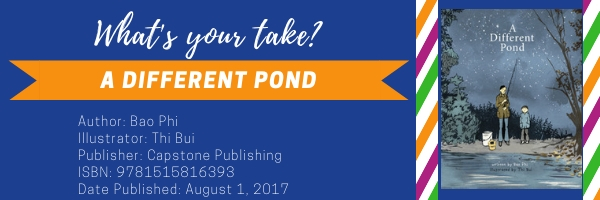By Celeste Trimble, St. Martin’s University, Lacey, WA and María Acevedo-Aquino, Texas A&M University-San Antonio, San Antonio, TX
This month Celeste and María consider stories that examine issues of hunger, poverty and homelessness. In each of the stories, the characters are represented in a dignified and respectful manner. This week, they discuss A Different Pond, written by Bao Phi and illustrated by Thi Bui.
CELESTE: A father takes his son fishing in the early morning. He tells his son some stories about his childhood in Vietnam. Because they catch fish, they will have enough food for the family’s dinner that night. The son is proud that he participated in feeding his family.
Visually, this is such a stunning book. I love the dominance of blues, like the night sky, the early morning sky. It is a cold color that contrasts perfectly with the warmth of the story. The relationship between the father and son is sweet and I connected with this emotional element. The kindness shows up in the writing as well as the images. A great example of this tenderness is when the father asks if the boy wants to put the bait fish on the hook. The boy does not want to hurt the little fish and declines. On the following page, dad has a hand on the boy’s shoulder, the moon is reflected in the water, a bridge in the distance. The text says, “My dad smiles. He isn’t upset with me.” I love seeing tender parenting in children’s literature, especially in the context of a difficult issue, such as poverty and hunger.
MARÍA: Stories are also a powerful tool and experience in this book. The father tells stories about his life in Vietnam, fishing, and war. The child enacts some familiar stories as he makes a fire and lights it with just one match. Together, they make new stories to navigate their new reality because “everything in America costs a lot of money.” The stories help the child understand the larger picture and the efforts that his parents make every day. These stories are full of acts of kindness.
In fact, I think that kindness is the second big theme that connect all these books. Kindness toward best friends, classmates, strangers, and family.
CELESTE: I agree! There is one page where two panels highlight others in the community who fish at the same pond. The Hmong man who tells funny jokes, and the Black man who shares his collection of colorful lures. In the images, everyone is smiling, there are high fives and laughter. I enjoy this portrayal of a community of diverse people coming together for a common reason, fishing. The danger of this is romanticizing poverty and the need for subsistence fishing, however I do not think this happens in A Different Pond. There is a balance in this story that uplifts and dignifies the characters, while at the same time allowing the reader to understand that the necessity of their choices is a struggle. For example, both parents leave for work and the reader is shown that the boy’s siblings take care of him.
MARÍA: That’s an interesting point Celeste! I wondered about the reasons of why the other two characters were fishing. I could assume that it is for survival, but what if it’s not? There are other instances that also show the struggle of additional individuals in the story. Like the man who seems to be carrying what looks like a shopping cart with all sorts of stuff very early in the morning or the fact that joining Dad for fishing “hours before the sun comes up” does not appear to be a choice, but part of the child’s responsibilities.
Author: Bao Phi
Illustrator: Thi Bui
Publisher: Capstone Publishing
ISBN: 9781515816393
Date Published: August 1, 2017
Throughout June 2019, Celeste and María give their takes on books that look at hunger, poverty and homelessness. Check back each Wednesday to follow the conversation!
- Themes: Bao Phi, Celeste Trimble, Different Pond, Maria Acevedo-Aquino, Thi Bui
- Descriptors: Books & Resources, My Take/Your Take

